|
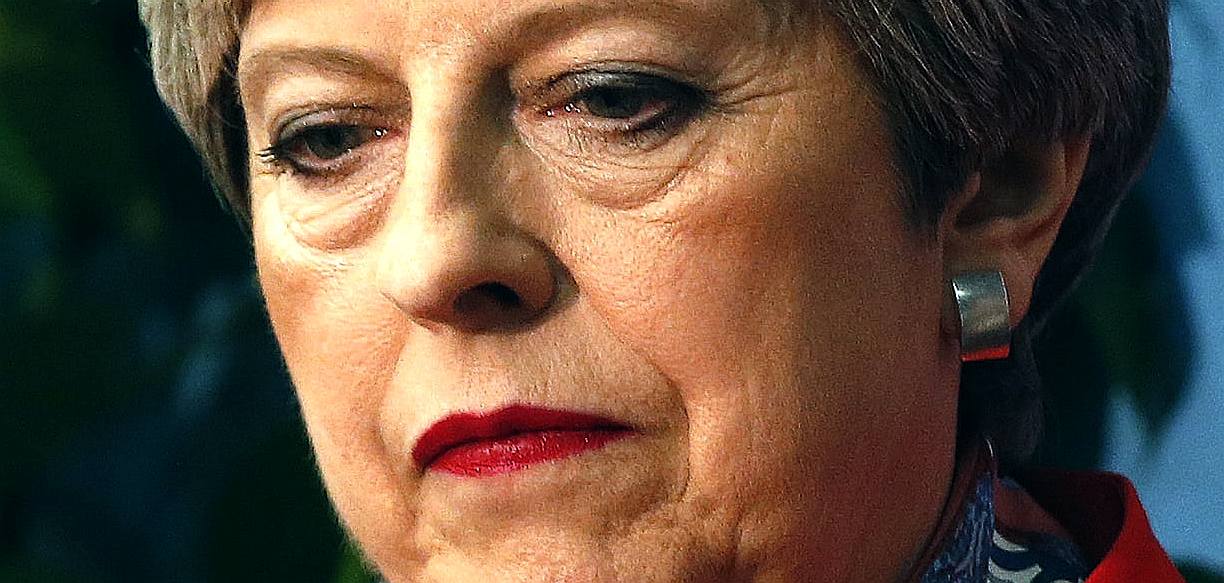
THERESA
MAY OR MAY NOT - Theresa May is finding it difficult to concentrate on
the main issues with so many pundits chirping up. If we are going to go,
then we'd urge the Prime Minister to work from a tick list and agree one
after the other to achieve the most satisfactory outcome - not only for
the United Kingdom - but also for our bedfellows in Europe, who after all
are our neighbours that we must work with to defeat common perils such as
climate change and ocean pollution.
It
is true and we must face facts, that Britain is not as Great as it once
was on the world stage. There are other super-powers now, but that is not
the point. No matter how big or small a country may be, we can all play
our part when it comes to a Circular Economy internationally. Europe will
appreciate this with their Commissioners coming our strongly in favour of
climate and pollution controls. It is not just about the money, important
that home security is, food and energy security are more important. Europe
in not about to let the UK starve when this country has so much to offer -
once we stop fighting each other. It is the politicians who are opening
old wounds long healed, in their muck-raking efforts to reverse the poll -
unfortunate that the result may have been.
THE
GUARDIAN - 4
FEBRUARY 2018
- BREXIT MESS CANNOT GO ON
Theresa May
must stand down now.
She is said to be the only senior Tory who could preside over the talks. The trouble is, she’s making Britain an international joke.
Let all the poisons that lurk in the mud hatch out”: the muttered incantation of the emperor in Robert Graves’s Claudius the God has rarely seemed so apposite. It is time for this government to drop the pretence that it is healthy and functioning. A reckoning is long past due. Daily, we see a new pustule or sore – on some days several. According to the
Sunday
Times, the Brexiteers are plotting to install Boris Johnson as prime minister, Michael Gove as his deputy and Jacob Rees-Mogg as chancellor. The last of those would be especially contentious, since the Moggster has spent much of the past week accusing the Treasury of “fiddling the figures” in its analysis of Britain’s prospective departure from the EU.
Yet – as if to pave the way for an ideological purge of Her
Majesty’s Treasury – the leading Brexiteer MP Bernard Jenkin accuses
Philip Hammond in the Sunday
Telegraph of trying to countermand the prime minister’s argument that we should leave the EU customs union. For those Tories who (mysteriously) regard Brexit as the path to a New Jerusalem, the chancellor’s call in Davos for only “very modest” changes to the UK’s relationship with the EU is simply a provocation too far.
It has become a grotesque pantomime. Tory remainers demand Johnson’s head every time he intervenes – as he did last month, briefing the press that the
NHS should be given £100m extra a week as a downpayment on what the foreign secretary still insists will be a grand Brexit bonanza. Whenever Hammond seeks to salvage this or that element of Britain’s economic relationship with
Europe, he is accused by leavers of disregarding the “will of the people”.
Few Tories now dispute the length and gravity of the charge sheet against Theresa
May: a disastrous general election, a terrible party conference and a reshuffle that merely advertised her weakness. The argument that her resilience is somehow noble is made much less frequently: in the midst of such political mayhem, it looks increasingly like stubborn political delusion.
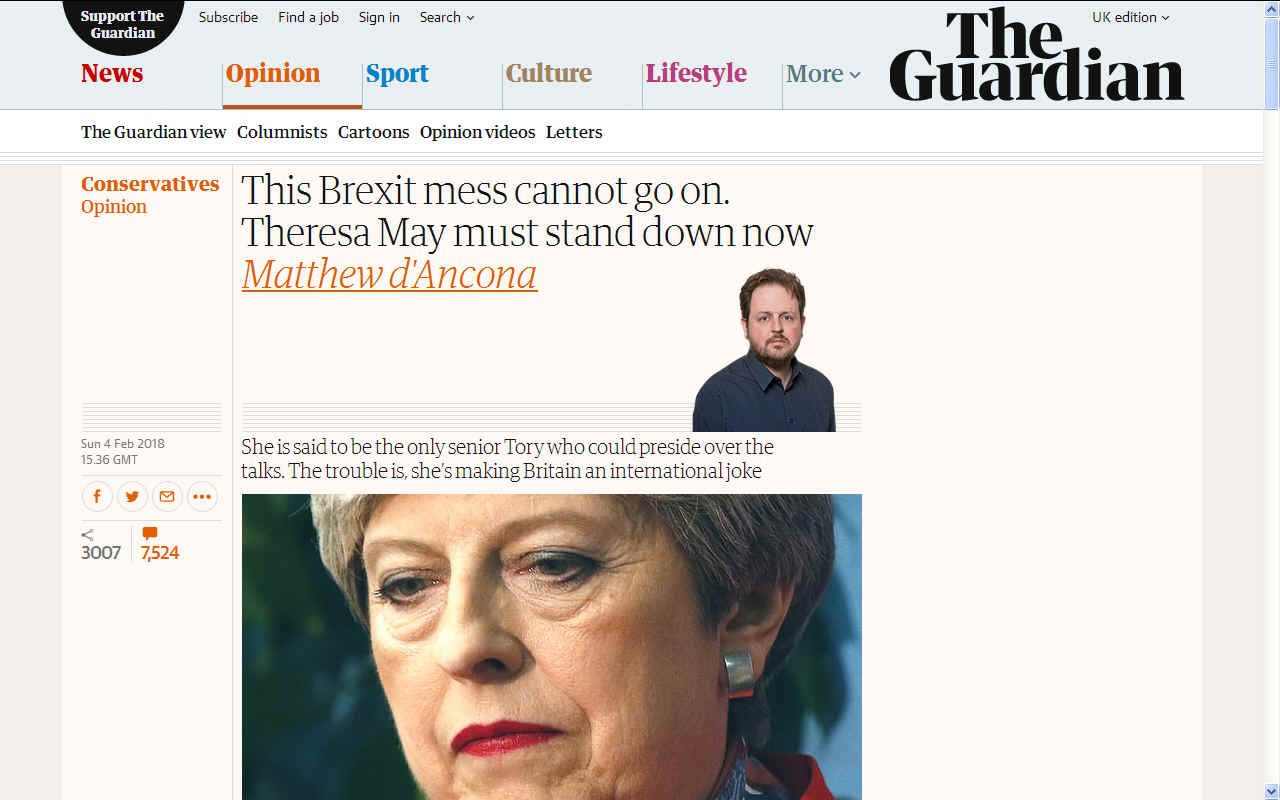
Still, though, one continues to hear that she should stay where she is, as the only senior Tory who can realistically preside over the “constructive ambiguity” required by the
Brexit talks – publicly demanding a clean break while quietly negotiating the complex, nuanced and unheroic deal that anyone remotely sensible knows is the only halfway palatable outcome.
The trouble is, she is doing no such thing. She is not the deft manager of meaning, soothing all sides and persuading each faction that its interests are being respected. She is the stuffed remnant of a once-optimistic prime minister, helpless in the midst of anarchic cacophony. This is government by taxidermy.
It is no longer plausible to argue that a formal test of her leadership would be a fatal disruption of the talks with Brussels. Without a decisive answer to the question “Who leads, and where?” I do not see how those talks can meaningfully proceed. We are an international joke, at risk of being taken to the cleaners by the EU or left with no deal at all. In such circumstances, clarification is not a distraction but precisely the opposite.
Were I in May’s shoes, I would pre-empt a confidence vote forced by letters from 48 of my own MPs, and – in the manner of John Major in 1995 – demand one myself (if necessary by instructing sympathetic backbenchers to trigger the process). I would then set out an explicit, unambiguous and unapologetic strategy for Brexit, and instruct the Conservative parliamentary party to back me or sack me.
Let us say, as seems quite probable, that MPs sacked her, as they did Iain Duncan Smith in 2003. There would then be a period of bedlam as the Tory party fought with teeth bared and daggers drawn to settle not only its future but the future of Britain’s relationship with the EU. It would be ugly, protracted and almost entirely destructive.
Would the answer that emerged at the end be sustainable? Would the new Conservative leader – and, if the Commons pact with the
Democratic Unionist party held – prime minister be able to provide the discipline and clear sense of trajectory that has been so conspicuously lacking under May? Quite possibly not. But that is the whole point. It may well be that the Tory party, as presently constituted, is structurally incapable of meeting the patriotic needs of the hour. It really is for the Conservatives, and not the rest of us, to prove that this suspicion is unfounded.
At any rate, the present arrangement is a hideous international embarrassment. It seems to me painfully obvious that we need an extension of the negotiating period set by article 50 – entirely possible under its section 3 – if only to replace panic with some semblance of deliberation. And, sooner rather than later, there should be another general election.
I am scarcely Jeremy Corbyn’s greatest fan, but the notion that the status quo must be preserved simply to thwart his chances of becoming prime minister is not only democratically contemptible but morally outrageous. Indeed, the prospect of a fresh election would force Labour, at last, to spell out its plans for Brexit, and embrace the risks of clarity.
Yes, I know the voters are fed up of trudging to the polling booths. But they’ll be even more fed up if Britain sleepwalks into a second-rate status, with all that implies, because a clinically dead government was permitted by a mixture of squeamishness and boredom to remain on life support. Time to flick the switch and see what happens.
By Matthew d’Ancona
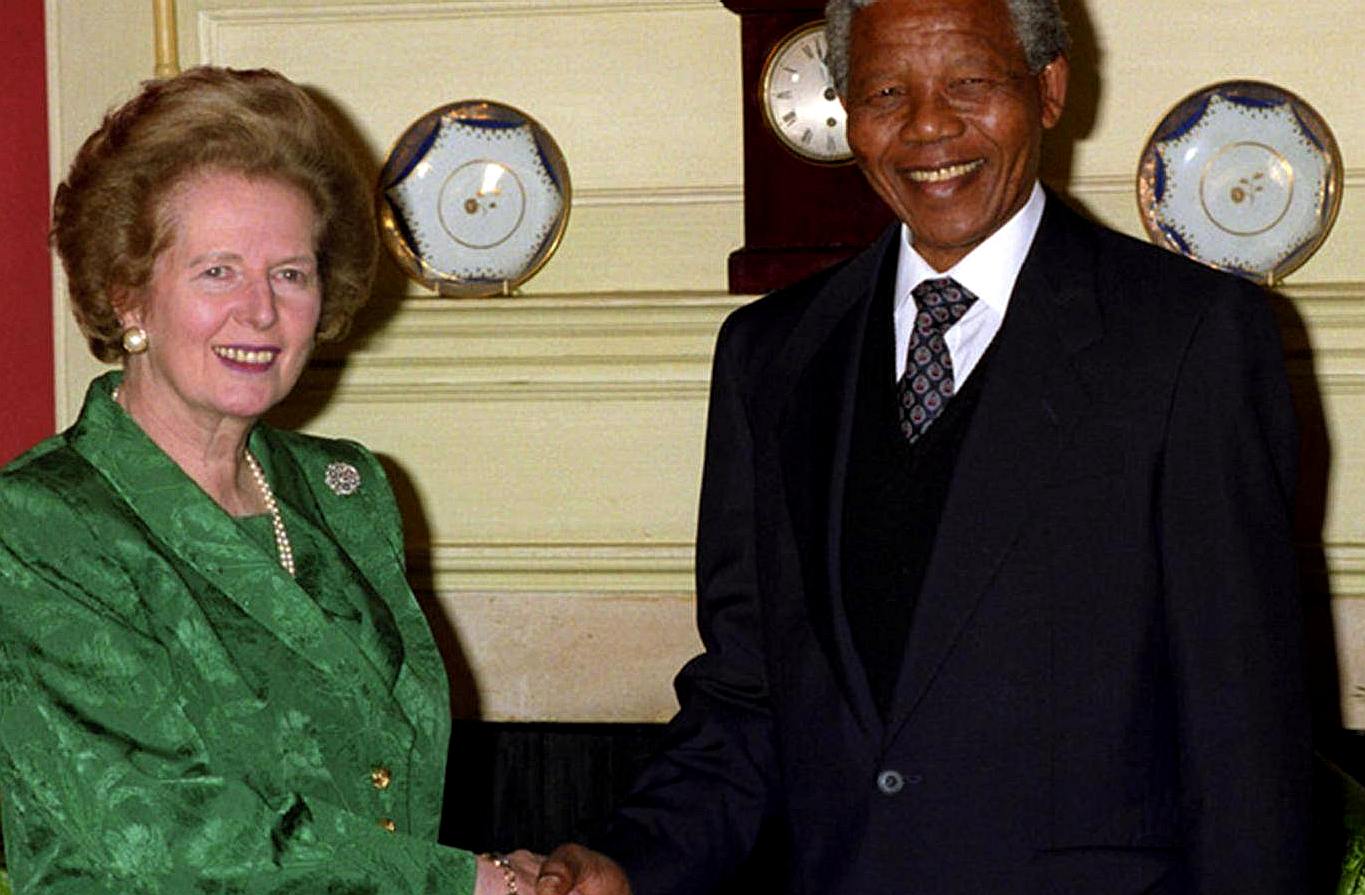
DR
PETER AMMON
- The image of Britain standing alone in the second world war against German domination has fed Euroscepticism in the UK, but does little to solve the country’s contemporary problems, the outgoing German ambassador to London has told the Guardian.
Dr Peter Ammon described the UK’s decision to leave the EU as “a tragedy” and a depressing moment, but also warned that Britain had “illusions” about the Brexit talks.
Ammon said Britain was rightly proud of its history, but some Brexiters were motivated by a sense of national identity built around Britain standing alone in the second world war.
With British cinemas full of films such as Darkest Hour and Dunkirk, Ammon said: “History is always full of ambiguities and ups and downs, but if you focus only on how Britain stood alone in the [second world] war, how it stood against dominating Germany, well, it is a nice story, but does not solve any problem of today.
Ammon was German ambassador during some of the talks between EU leaders and the former British prime minister
David Cameron
in 2015 on the possibility of reforms that could have led to terms for Britain staying in the EU. But he says he does not think a more generous German offer would have changed the referendum outcome.
“I don’t think an emergency brake [on EU immigration] would have solved the problem for those who wanted to define their identity and those that wanted to protest. It would have been impossible to communicate it. There was so much propaganda in the media – I am sorry, I cannot call it anything else.”
Brexit, he said, was part of a wider, international populist revolt against politicians.
THE
GUARDIAN 3 FEBRUARY 2018
Theresa May is discovering, the UK’s overblown sense of its place in the world has led to overplaying our hand with the EU.
In his recent book Behind Diplomatic Lines, Patrick Wright, a former head of the UK diplomatic service, provides an illuminating account of Margaret Thatcher’s worldview. The former British premier wanted South Africa to be a “whites-only state”, and believed the Vietnamese boat people should be pushed into the sea before they reached
Hong Kong. In addition, the late prime minister was particularly gripped by “Germanophobia”.
German ambassador: second world war image of Britain has fed Euroscepticism
Read more
“She seems to be obsessed by a feeling that German-speakers are going to dominate the [European] community,” Wright writes. “Any talk of German reunification is anathema to her.” At one point it got so bad that the former foreign secretary Douglas Hurd claimed: “Cabinet now consists of three items: parliamentary affairs, home affairs and xenophobia.”
So when the outgoing German ambassador to Britain claimed this week that Brexiteers were fixated on the second world war, he was on to something. Referring to the popularity of films such as Darkest Hour and
Dunkirk, Peter Ammon said: “History is always full of ambiguities and ups and downs, but if you focus only on how Britain stood alone in the [second world] war, how it stood against dominating Germany, well, it is a nice story, but does not solve any problem of today.” (If the second world war taught us anything, it was that you couldn’t stand alone. They weren’t called “the allies” for nothing.)
There were some sound reasons for voting to leave the EU – although the campaign was rarely fought on them, and wasn’t won because of them. And this nostalgia for a particular, and peculiar, version of our history long preceded Brexit. Remarking on the chant “Two world wars and one World Cup” that rang out whenever England played Germany at football, academic Paul Gilroy wrote, in After Empire: “The boast to which the phrase gives voice is integral to a larger denial. It declares nothing significant changed during the course of Britain’s downwardly mobile 20th century … We are being required to admit that the nations which triumphed in 1918 and 1945 live on somewhere unseen, but palpable.”
But Ammon was only half right. For while the Brexit vote was certainly underpinned by a melancholic longing for a glorious past, the era it sought to relive was less the second world war than the longer, less distinguished or openly celebrated period of empire. For if memories of the war made some feel more defiant, recollections of empire made them deluded. Our colonial past, and the inability to come to terms with its demise, gave many the impression that we are far bigger, stronger and more influential than we really are. At some point they convinced themselves that the reason we are at the centre of most world maps is because the Earth revolves around us, not because it was us who drew the maps.
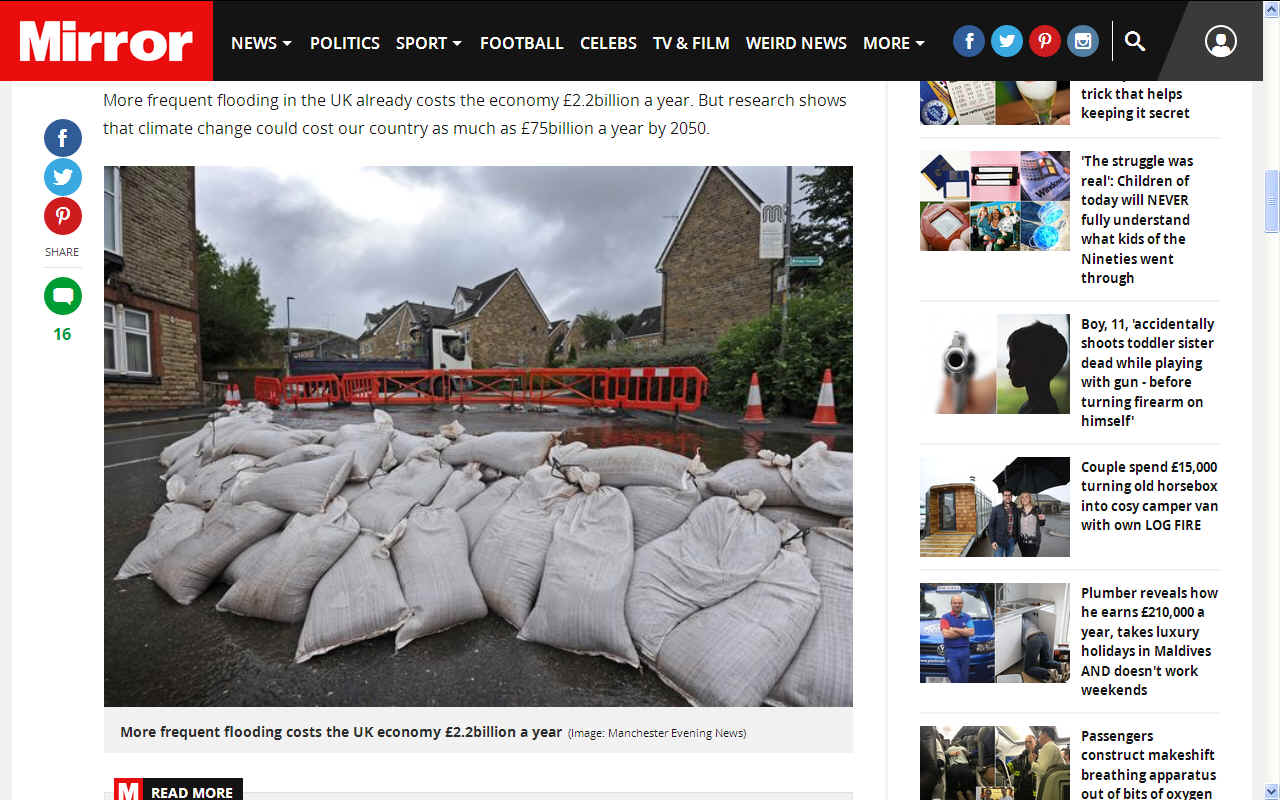
It was through this distorted lens (“Let’s put the Great back in Great Britain”) that a majority voted to leave. Ammon puts the fantasies down to war stories from Brexiteers’ childhoods. “Obviously every state is defined by its history, and some define themselves by what their father did in the war, and it gives them great personal pride.” But British history didn’t stop after the war. Empire was more recent and, for a considerable element of the Brexiteers’ campaign, more personal.
Douglas Carswell, the sole Ukip MP during the referendum, was raised in Uganda; Arron Banks, who bankrolled Ukip and the xenophobic Leave.EU campaign, spent his childhood in
South
Africa, where his father ran sugar estates, as well as in Kenya, Ghana and Somalia; Henry Bolton, the current head of Ukip, was born and raised partly in Kenya; Robert Oxley, head of media for Vote Leave, has strong family ties to Zimbabwe. One can only speculate about how much impact these formative years had on their political outlook, (Carswell attributes his libertarianism to Idi Amin’s “arbitrary rule”) but it would be odd to conclude they didn’t have any.
But if echoes of empire reverberated through the campaign, they have also framed our negotiating strategy. The past 18 months have illustrated the journey from hubris to humiliation. For a couple of generations, we have seen our attributes and others’ weaknesses through the wrong side of a magnifying glass; now our diminished state is becoming fully apparent, and, like Boris Johnson, the foreign secretary, reciting
Kipling in Myanmar, we are struggling to adjust.
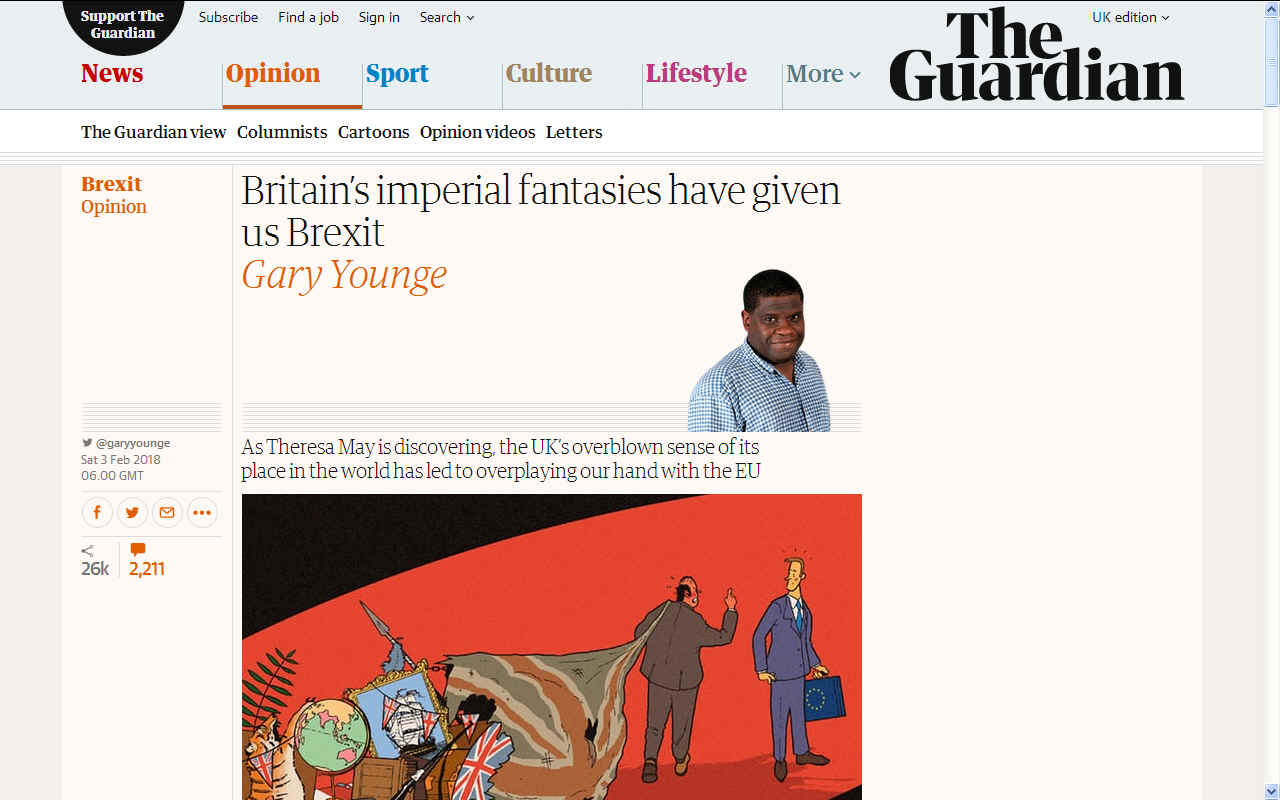
GARY
YOUNGE - Gary may have a point here that the whole Brexit fiasco is
because of misplaced and misguided sentiments harking back to the days of
the British Empire, when all of that is long gone - and so is World War
Two and nasty Mr
Hitler. Such thoughts have no place in modern politics, in a global
community.
This awakening would be funny (abroad they find it hilarious) if it were not so consequential. Johnson told the Commons the EU27 could “go whistle” for an extortionate Brexit bill. They whistled; now we will cough, to the tune of £35-40bn.
During her 2017 election campaign, Theresa May, channelling her inner Thatcher, boasted about being a “bloody difficult woman”. “The next man to find that out will be
Jean-Claude Juncker,” she claimed. In fact Juncker, the president of the
European
commission, and his team have found May more overwhelmed and befuddled than overwhelming and belligerent. After one Downing Street dinner, European negotiators concluded that she “does not live on planet Mars but rather in a galaxy very far away”.
In a recent private meeting between May and the German chancellor, Angela
Merkel, the two leaders reportedly found themselves in a tragicomic conversational loop. May kept telling Merkel: “Make me an offer.” To which Merkel would reply: “But you’re leaving – we don’t have to make you an offer. Come on, what do you want?” To which May would retort: “Make me an offer.”
A change of leader won’t make this right. Lacking authority and coherence, haemorrhaging relevance and credibility, May is a faithful reflection not only of her government but of the country at this moment. Brexiteers have ostensibly got what they want:
Brexit. They assumed we could dictate the terms; we can’t. They assumed we could just walk away; we can’t. They had no more plans for leaving than a dog chasing a car has to drive it. They are now finding out how little sovereignty means for a country the size of Britain in a neoliberal globalised economy beyond blue passports (which we could have had anyway). What we need isn’t a change of leader but a change of direction.
May is no more personally to blame for the mess we are in with Europe than Anthony Eden was for the mess with the 1956 Suez crisis – which provides a more salient parallel for Britain than the second world war. It took Britain and
France overplaying their hand, in punishing
Egypt for seizing the
Suez canal from colonial control and nationalising it, to realise their imperial influence had been eclipsed by the US and was now in decline.
“France and England will never be powers comparable to the United
States,” the West German chancellor at the time, Konrad Adenauer, told the French foreign minister. “Not Germany either. There remains to them only one way of playing a decisive role in the world: that is to unite Europe … We have no time to waste; Europe will be your revenge.”
Once again, Britain has overplayed its hand. Preferring to live in the past rather than learn from it, we find ourselves diminished in the present and clueless about the future.
• Gary Younge is editor-at-large for the Guardian
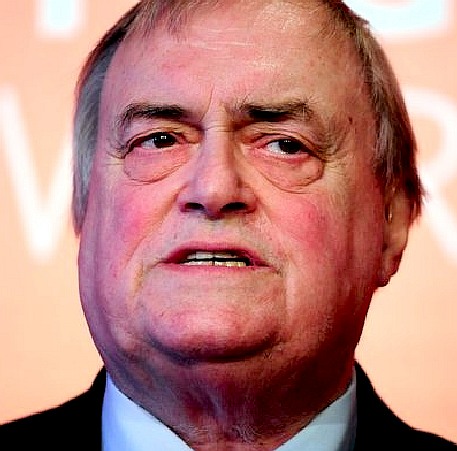
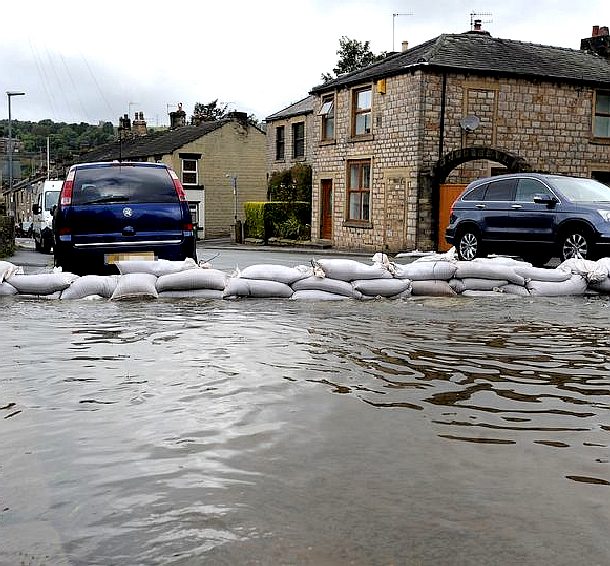
DAILY
MIRROR NOVEMBER
2017
Next week’s Budget is crucial for Britain’s future. The Tories have left our public services in crisis,
housebuilding is at its lowest since the 1920s, and Brexit threatens to wreck our economy.
Chancellor Philip Hammond knows – with a hefty potential £60billion
divorce bill for leaving the EU – he’s not going to have the money to fix the mess the Tories caused unless he borrows.
But there is a much greater threat to Britain that’ll make Brexit look like a tea party.
One that will come to dominate politics for decades to come.
Climate change
More frequent flooding in the UK already costs the economy £2.2billion a year. But research shows that climate change could cost our country as much as £75billion a year by
2050. Labour’s Shadow Chancellor John McDonnell gets this.
His idea to make the Office for Budget Responsibility, which oversees Government spending, factor climate change in to all future financial forecasts is a smart move.
Governments around the world have all woken up to the fact that climate change is the greatest threat to the planet and the global economy.
I’ve been in Bonn for the latest climate change talks. A lot has changed 20 years on from me helping to broker the Kyoto Treaty, which saw 44 countries sign up to cut
carbon emissions.
Some 196 nations have now backed the Paris Protocol to tackle climate
change, though Trump is threatening to take the US – the biggest polluter – out.

I remember that the oil, car and
coal industries bitterly opposed us getting a deal at Kyoto, even questioning the science of climate change. They’re not arguing now. But big industrial nations like the US and UK and countries across Europe had our economic growth fuelled by oil, gas and coal.
Developing countries, which account for two-thirds of nations, took the view that the pollution was caused by the industrial West and that we should pay.
These countries want the growth we had to lift them out of poverty. But they need our help so they can get their growth using low-carbon power sources, such as solar and renewables.
These countries on the front line of the effects of man-made pollution told me at the conference they are still not getting the
money promised to them by the biggest polluters.
But the scientists made it absolutely clear that even if we all move to low carbon – reduce fossil fuels, introduce
electric cars and switch to renewables – it still won’t limit the temperature rising.
They say that what is necessary is to produce a more radical set of policies and accepting we need a new sustainable model of growth that puts the
planet, not profit, first.
Labour’s idea to put the effects of climate change at the heart of its economic plans is spot on.
By John
Prescott
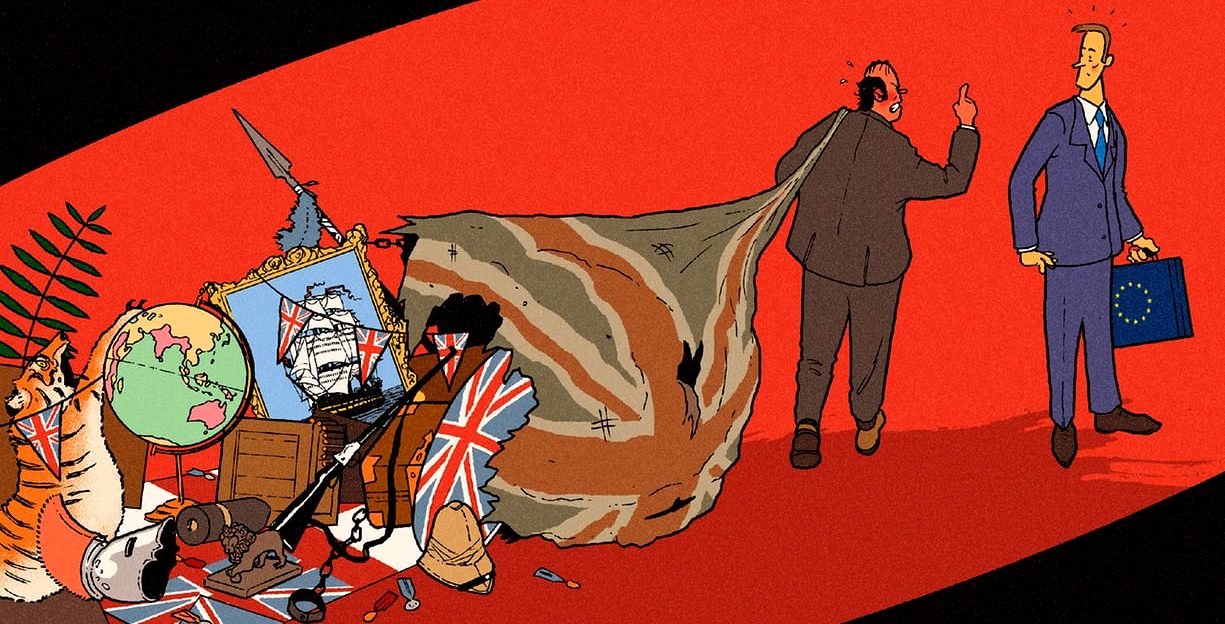
DWELLING
ON THE PAST - It is nice to reflect on our past from time to time, and
yes, its a great source of inspiration for film makers - but it is wrong
to LIVE in the PAST when the PRESENT requires your urgent attention. The
cement is drying out and we are not laying any bricks. It we wait much
longer the cement will cure and then our bricks will just be a
disorganized pile of rubble instead of a sturdy wall of common sense
solutions.
CONTACTS
Theresa May
Prime
Minister
House of Commons
London
SW1A 0AA
Phone:
Email:
LINKS
& REFERENCE
https://twitter.com/garyyounge https://www.theguardian.com/commentisfree/2018/feb/03/imperial-fantasies-brexit-theresa-may https://www.theguardian.com/politics/2018/jan/29/german-ambassador-peter-ammon-second-world-war-image-of-britain-has-fed-euroscepticism
https://www.theguardian.com/commentisfree/2018/feb/04/brexit-mess-theresa-may-tories
https://friendsoftheearth.uk/
http://www.kerrymccarthymp.org/
https://www.mirror.co.uk/news/politics/climate-change-much-greater-threat-11546658
http://www.debbonaire.co.uk/
https://www.facebook.com/LetsStopPlasticPollution/
https://skyoceanrescue.com/
ACIDIFICATION
- ADRIATIC
- ARCTIC
- ATLANTIC
- BALTIC
- BAY
BENGAL - BERING
- CARIBBEAN
- CORAL
- EAST
CHINA SEA
ENGLISH
CH - GOC
- GULF
GUINEA - GULF
MEXICO - INDIAN
-
IOC
- IRC
- MEDITERRANEAN
- NORTH
SEA - PACIFIC
- PERSIAN
GULF - SEA
JAPAN - STH
CHINA - SOUTHERN
- PLASTIC
- PLANKTON
- PLASTIC
OCEANS - SEA
LEVEL RISE - UNCLOS
- UNEP
WOC
- WWF
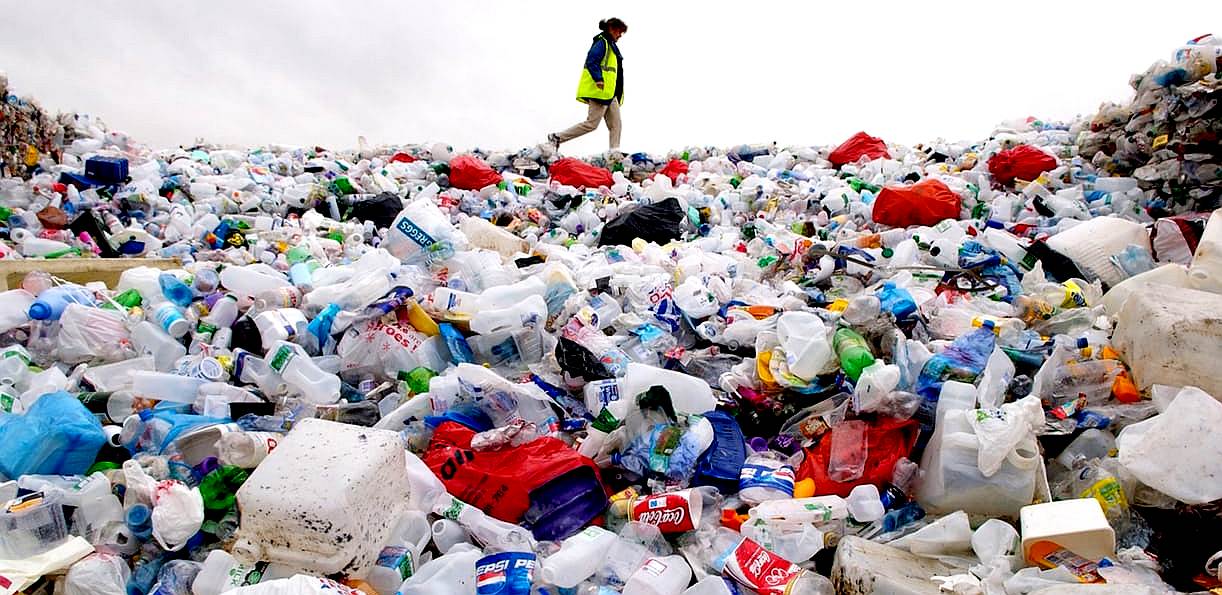
|









